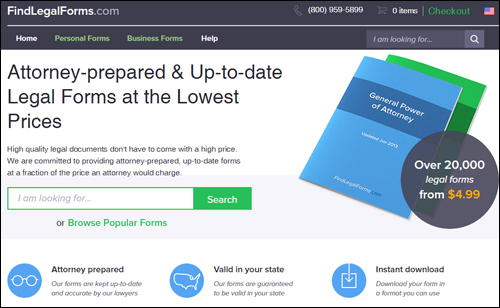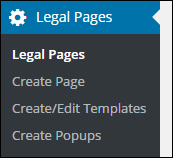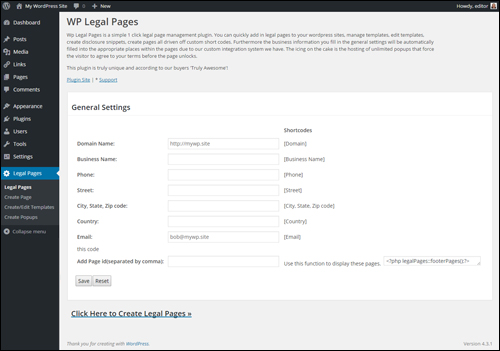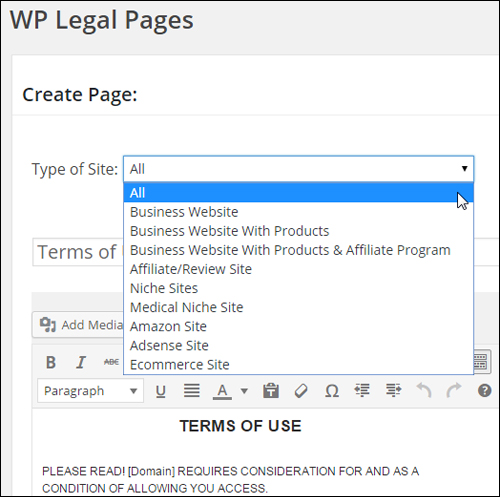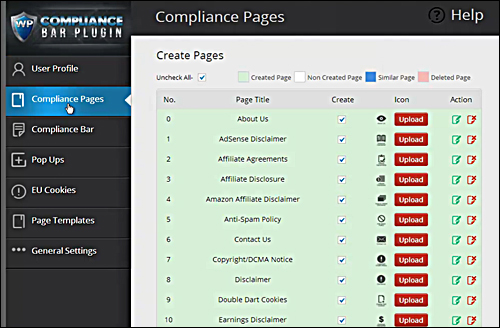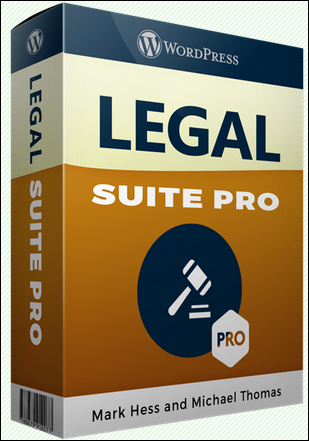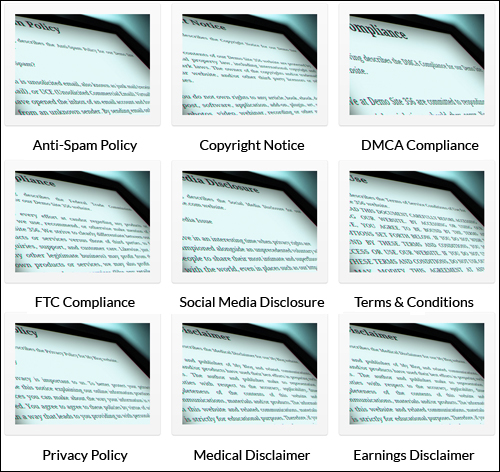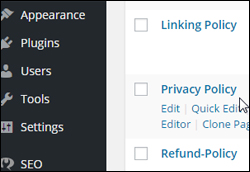
One of the worst situations a website owner can find themselves in is to be on the wrong side of the law.
As the digital era continues growing at an overwhelming speed and rules constantly change, it’s important to stay on top of what’s going on and make sure that your website or blog remains legal, especially if having a digital presence is important in the success of your business strategy.
New laws introduced in 2014 regulating how businesses promote advertising on their websites state that if you promote anything on your site for commercial gain, then you need to follow certain disclosure guidelines to prevent enforceable orders being issued against you by regulatory agencies, such as the US-based Better Business Bureau (BBB). Search online for information about “The Online Interest-Based Advertising Accountability Program,” which regulates behavioral advertising across the internet for more details.
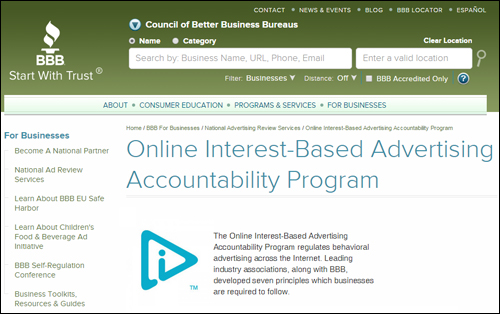
(Better Business Bureau Website)
The new laws has legal ramifications for several business activities, including:
- Any kind of advertising, including inline ads, Google Adsense, etc.
- Retarget Marketing
- Google Analytics (or other analytics software)
- Affiliate Marketing
- Product Creators
- Bloggers
- etc.
If your site does not display certain pages to visitors (e.g. terms and conditions of use, privacy policy, financial disclaimers, etc.), many sites such as Google won’t let you advertise, digital marketplaces like ClickBank will not let you list your digital products for sale, PayPal may close down your account, Facebook will disapprove web applications, and you won’t be allowed to participate in most advertising and affiliate marketing networks.
Additionally, you could also be inadvertently leaving yourself open and vulnerable to litigation.
This article explains the importance of having a compliant website and shows you simple and inexpensive methods that will help make your WordPress site compliant quickly and easily.

Does Your Site Comply With The Law?
![]()
Legal Disclaimer: Please note that we are not lawyers and we cannot provide legal advice about your website or business. You must do your own due diligence and we recommend consulting legal experts about the best way of ensuring that your website is compliant with the law wherever your business is based.
Why It’s Important To Make Your Website Compliant
Is your business at risk? Consider for a minute what the implications to your business would be if any of the situations below were to take place:
- A user suffers a heart attack after they use your online fitness workout.
- The skin care lotion you sell as an affiliate marketer gives a number of users allergic reactions.
- You’ve let your subscribers know that you will not sell their information, but you have not spelled out exactly what you will do with their personal details.
- Someone copies content from your website and puts it up on their own website.
- There is no statement on your site making visitors aware that you are promoting a product as an affiliate and could receive a financial benefit if they purchase it.
- You didn’t spell out the terms of your return policies.
- Someone claims that your testimonials are misleading and decides to sue you.
- You did not disclose in a product review that you were given a free copy of the product.
- Your site includes adult content and you didn’t take appropriate measures to keep underage children from accessing it.
Consider too these actual examples of costly compliance breaches:
- A CPA Marketer failed to provide adequate disclaimers telling visitors they would be required to give up personal information to complete a debt reduction offer. Cost = $390,000.
- A social networking app developer received a whopping $800,000 fine for collecting personal information without users’ knowledge and consent – including storing private details about children.
- Facebook’s Terms Of Service does not allow users to scrape UIDs. Many internet marketers gambled that they could get away with it and lost. Their accounts were shut down, costing them thousands of $$$ in lost revenue.
- An independent 2010 study by Brad Geddes of SearchEngineLand, showed that, of a couple of hundred websites picked at random, more than 90% had breached at least one of Google’s policies, more than 65% had broken at least 2 of Google’s policies, and more than 40% were in breach of at least three of Google’s policies. Although the website owners could technically be sued by Google, more than likely what could happen, is that they would be issued notices or lose access entirely to the Google program whose policies they had violated, which could result in loss of income (e.g. AdSense or AdWords).
Can you see how easy it is to risk being targeted for litigation through non-compliance?
Regardless of whether you are a:
- CPA Marketer
- Network Marketer
- Affiliate Product Promoter
- AdWords User
- Info Product Marketer
- Amazon Affiliate
- EBay Seller
- Adult Content Publisher
- Freelancer, Coach or Consultant
- Online Seller Of Any Service Or Product
You need to make sure that your online business is legally compliant.
Complying With 3rd-Party Services - ToS, Policies, etc.
Leading online companies and government agencies that regulate trade in most countries emphasize the need of complying with the terms and policies of service providers.
You must let your site users know that your website complies with all necessary legal requirements and professional guidelines. This not only increases trust and confidence in your site, it’s also required in most cases by most companies you do business with.
Let’s take a look at some examples:
Google requires your site to display legal information when using many of their products or features. This includes Google Analytics …
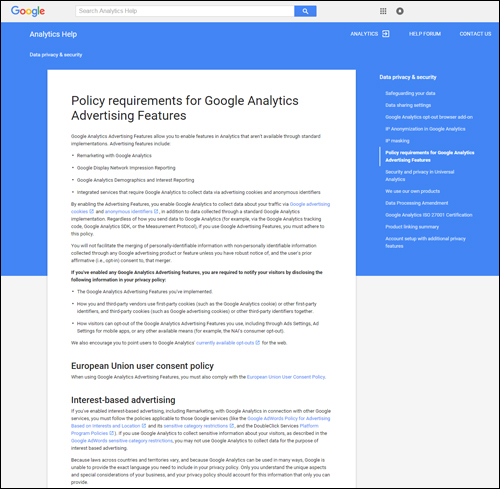
(Google Analytics – Policy Requirements)
Generating revenue online with your blogs using Google AdSense advertising …
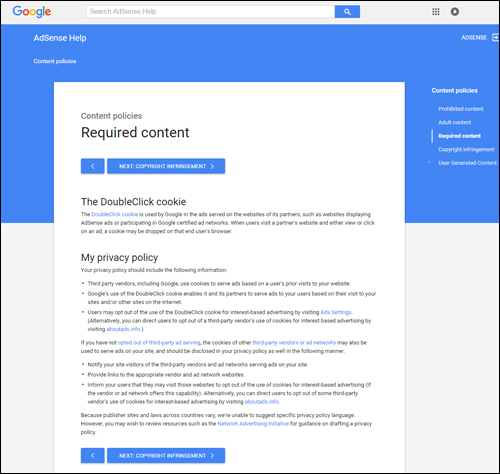
(Google AdSense - policy requirements)
And even promoting your business using Google AdWords …
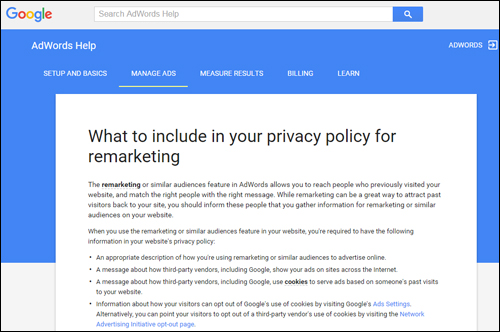
(Google AdWords – Policy Requirements)
If you plan to sell products online via companies such as ClickBank, JVZoo, or other established online merchant networks, you will be required to add a number of legal pages to your site before they will approve your products for sale …
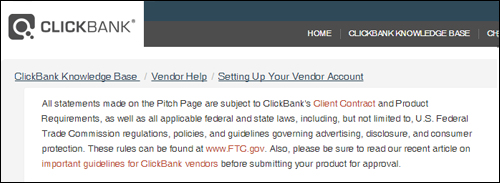
(ClickBank – policy requirements)
The Federal Trade Commission (FTC) also requires that you add clear disclaimers and statements to visitors, especially regarding the use of testimonials or product endorsements …
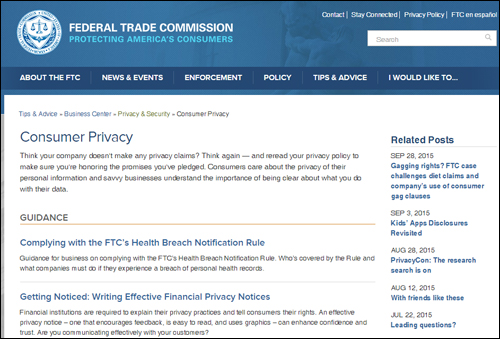
(FTC – consumer policies and regulations)
FTC Regulations – Ensure That Your Site Is Compliant
FTC regulations governing the conduct of businesses online were introduced in March 2012. A quick search online will easily reveal that many sites are still unaware (or choose to ignore) these requirements. As has happened in the past, this typically ends up with the FTC making an example of businesses and prosecuting website owners for breaches of regulation in an effort to get other businesses to comply.
If you do any kind of money-making activity online, therefore, it’s best not to take any chances. Even if your business does not operate in the U.S. we strongly recommend protecting your business interests by making sure that your website is compliant with FTC regulations and guidelines.
A number of online resources provide guidelines for structuring disclaimers and disclosures to help your site meet FTC requirements. We provide a number of references and links to resources at the end of this article …
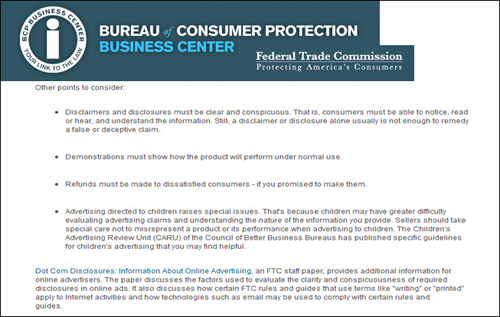
(It’s important to structure your disclaimers and disclosures correctly to avoid running foul of the law)
Social Media Applications Also Require Compliance
If you are planning to create social networking applications that will integrate with your website, you will also be required to provide sites like Twitter, Facebook, and others with access to your legal pages …
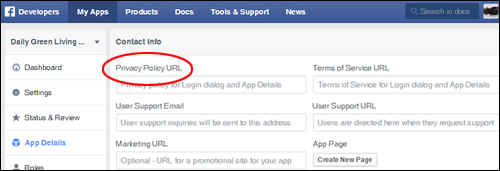
(Facebook developer app – policy requirements)
![]()
- If you are not sure whether you may be breaking the law, and/or Terms of Service policies and guidelines of websites like Google, Facebook, etc., then assume that you most probably are.
- If you are considering promoting services or products on your site via affiliate marketing, or making money online with Google AdSense, eBay or Amazon advertising, or use Google AdWords to drive visitors to your pages, etc., then find out exactly what kind of legal information you are required to include on your site to comply with their Terms Of Service and policy requirements to avoid having your accounts shut down.
- If you have ever wondered if “borrowing” a Copyright Notice is Copyright infringement, then it’s best to act now and take proper precautions to avoid becoming a magnet for litigation.
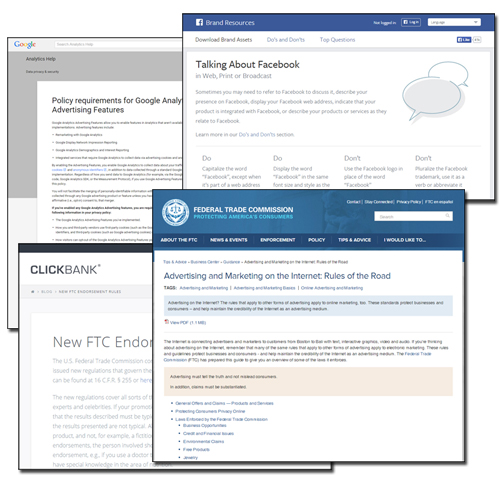
(In addition to legal and regulatory compliance, most 3rd-party services require you to comply with their terms of use)
What Legal Information Should I Add To My Website To Be Covered Against Legal Compliance Issues?
If your web site lacks in aspects of compliance, then this section will help you.
Adding the following compliance pages to your site should keep you out of trouble with most regulatory agencies and external service providers, and help to avoid possible legal issues):
- About Us Page
- Contact Us
- Privacy Policy
- Terms And Conditions
- Disclaimers
- General Data Protection Regulation (GDPR) Compliance
As well as the pages above, you may want to consider including one or more of these pages:
- Affiliate Agreement (if you sell products or services through an affiliate program)
- Anti-Spam Policy
- Earnings Disclaimer
- External Linking Policy
- Health Disclaimers (if your website or blog provides health or medical information)
- Refund Policy (if you sell products or services online)
- Audio/Video Terms (if you allow media downloads on your site)
Disclosure Pages – Types
Adding the correct type of content disclosure is important. For example:
- No Material Connection – Discloses to your readers that you’re not receiving compensation for writing the post.
- Affiliate Links – Discloses to site users that you will receive compensation if they act on your recommendation and purchase through your affiliate link.
- Sample Or review Copy – Lets visitors be aware that you have been given a review or sample copy of the product or service.
- Sponsored Post – Disclosure that lets site users be aware that you were compensated in some way to write the article.
- Third Party Advertising – Informs visitors that you’re using online behavioral tracking technology. This is required to satisfy the “enhanced notice” the Better Business Bureau has been requiring website publishers to show prominently on their sites since January 1, 2014.
How To Add Compliance Pages To Your Site
Ideally, you should have your lawyer prepare the verbiage of your legal documents. Once this has been created, there are several ways to add them to your website.
Uploading Legal Pages Manually
If someone prepares and delivers the legal content for you in HTML format, you can simply upload these to your web server, or have someone upload these pages for you.
We recommend adding a legal folder to your web server and uploading HTML pages containing your legal documentation to this directory via FTP …
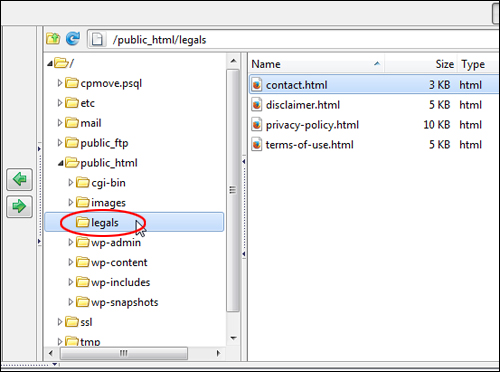
(Create a ‘legals’ folder on your web server and upload pages via FTP)
You can then easily add links to your pages from your WordPress site using a custom WordPress menu …
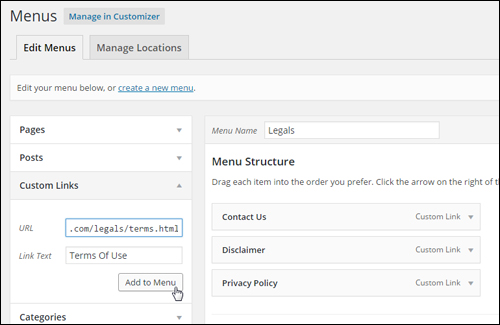
(WordPress Menu)
Make sure that your legal pages are fully up-to-date and display clearly to your visitors. You can add these to the sidebar menu (or the footer of your website) to ensure that users have access to legal information from every web page …
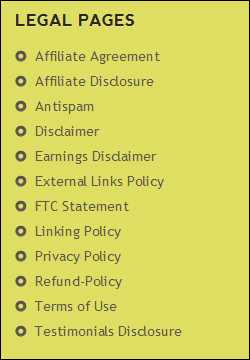
(Display links to legal pages to visitors on all of your site’s pages)
For a detailed step-by-step tutorial on adding links to pages on your sidebar or footer, see this step-by-step tutorial:
Legal Templates
You can easily find attorney-drafted downloadable website forms and agreements by searching online, or going to websites like this one:
Find Legal Forms
(Find Legal Forms – Legal forms)
To learn more, go here:
Another option is to purchase a set of cut and paste website legal templates written by attorney Scott Talbert to help businesses protect themselves online …
Cut And Paste Website Legal Pages
(Cut And Paste Website Legal Pages – Website Legal Pages)
Cut & Paste website legal templates feature less passive voice and more plain language phrasing and can be easily customized with a quick search and replace to add your own details, then pasted into your pages.
The legal templates included in Scott Talbert’s Legal Form Templates include:
- Anti-Spam Policy
- Copyright Notice
- Disclaimer: multi-discipline professional disclaimers
- DMCA Compliance
- Federal Trade Commission Compliance (This proprietary FTC page accommodates FTC regulations brought into effect on March 2012)
- Privacy Policy: Google & DoubleClick DART, etc.
- ToS & Conditions of Use: with inter- & intra-page redundancy, Contra Proferentem provision, reservation of rights, and exclusive social media admonition.
You can either create a new page for every legal form you want added to your site, then paste the content from the templates into your web pages and publish or upload your legal pages to your server as described earlier.
Go here to learn more:
WordPress Plugins – Legal Pages
As well as using cut & paste legal templates, you can simplify things using plugins.
Here are some legal WordPress plugins that you may be interested in using:
WordPress Legal Pages Plugin
(WordPress Legal Pages)
If you don’t want to bother with creating legal pages manually, then consider installing WordPress Legal Pages …
WP Legal Pages is not a free plugin, but it’s a very affordable and well-supported premium plugin that will help simplify the job of creating and implementing legal pages on your website and save you loads of headaches.
Here are just some of the reasons to consider using WordPress Legal Pages plugin:
- Pre-written Legal Templates – The plugin gives you access to over 20 built-in legal templates created by a team of professional lawyers.
- Very Quick And Easy To Use – Set up most of your basic legal pages in a few minutes with just a few mouse clicks.
- Customizable Pages – Includes customizable and easily editable legal form templates (e.g. Terms Of Service, Disclaimer, Privacy Policy, Earnings Disclaimer and more!)
- Editable Pages – WordPress content editor lets you edit legal pages like any page on your site.
- Shortcodes – You can add shortcodes to any of your pages and the information will be automatically inserted into your pages when you publish.
- Exclude pages. The plugin lets you exclude pages from menus with a simple checkbox and delete and manage these like every other WordPress page.
- Forced Options – Force page lockdown. Page unlocks when the user agrees to your legal terms.
- Additional Features – More features are being added to this plugin with each new version.
When you install WordPress Legal Pages, a menu item will display inside your dashboard area …
(WordPress Legal Pages – Menu)
This allows you to create, edit and view your legal pages from your admin area …
(WordPress Legal Pages – Settings Area)
With WP Legal Pages, you have the option of creating legal pages for different online uses, such as business websites with products, affiliate/review websites, AdSense sites, etc …
(WP Legal Pages – Page Type)
Choose from several built-in legal templates …
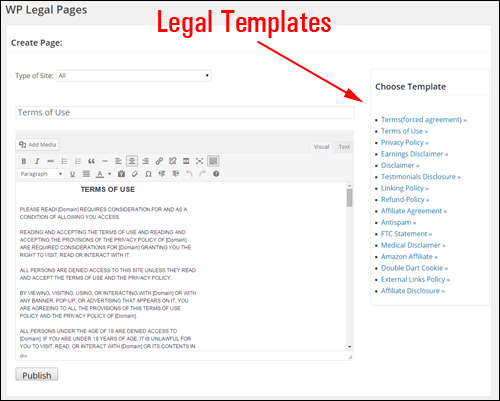
(WP Legal Pages – Pre-configured Templates)
Legal page templates include:
- Terms of Use (Users are forced to agree to Terms and Conditions before using site)
- Linking Policy
- External Links Policy
- Terms and Conditions
- Refund Policy
- Affiliate Disclosure
- Privacy Policy
- Affiliate Agreement
- Facebook Privacy Policy
- Earnings Disclaimer
- Antispam Policy
- DoubleClick DART Cookies Policy
- Disclaimer Template
- FTC Disclosure Statement Template
- Medical Disclaimer Template
- Testimonials Disclosure – As per FTC guidelines
- Amazon Affiliate Disclosure Template
- DMCA Policy Template
- California Privacy Rights Policy Template
- Digital Goods Refund Policy Template
- COPPA – Children’s Online Privacy Policy Template
- Blog Comments Policy Template
- Newsletter Subscription Policy and Disclaimer Template
- FTC Disclaimer Widget
Go here to learn more about using this plugin:
Compliance Bar – WordPress Plugin For Website Compliance
Compliance Bar is a simple WordPress plugin that includes over twenty customizable compliance pages for your online business …
Go here to learn more:
Legal Suite Pro
(Legal Suite Pro)
Legal Suite Pro Plugin lets you easily install professionally-written legal pages such as:
- Anti-Spam Policy
- Copyright Notice
- DMCA Compliance
- FTC Compliance
- Privacy Policy
- Social Media Disclosure
- Medical Disclaimer
- Terms And Conditions
- Earnings Disclaimer
(Legal Suite Pro Plugin For WordPress – Professionally-written legal forms)
Additionally:
- Drag & Drop FTC Disclaimer Widget: Add an FTC Disclaimer to any WordPress sidebar or widget area.
- Customizable EU Cookie Compliance Bar: Display an EU cookie compliance bar if you are getting traffic from the EU and your sites use cookies.
With just one-click you can install almost all of the legal pages your site needs and these professionally written legal pages can be created in your theme and/or as a standalone page outside of your theme.
The plugin developers have packaged high quality, professionally written legal disclaimers into a plugin that can be installed quickly on any WordPress powered site. You can have legal pages installed and set up on your site in less than one minute and the license allows you to install and use the plugin on all of your websites (even sites that you decide to sell or flip).
Go here for more info:
![]()
If using the services of a lawyer to create your online legal documentation is currently out of your budget, then consider implementing at least some form of legal protection on your website until you can afford legal services.
We want your website to be safe!
Download the FREE Legal Pages Generator tool below, or consider using one of the better solutions we discuss in this article, such as using attorney-prepared legal forms, or a plugin as described in the section below.

(Legal Pages Generator)
Legal Pages Generator Software allows you to easily generate necessary legal documents for your website including Terms of Service, Privacy Statement, Copyright Notice, Website Disclaimer and optional Earnings Disclaimer.
***
As stated earlier, if you do any kind of business online, it’s important that your site is compliant with legal requirements of government agencies that regulate how business online is done and the guidelines and terms of service (TOS) provided by 3rd-party services and products that you may be promoting or selling online. If your website isn’t compliant with laws designed to protect consumer rights, you’re breaking the law.
Being non-compliant puts you at risk of suffering both financial losses and the loss of your reputation. Why risk your money and reputation, when you can protect yourself so inexpensively?
![]()
Disclaimer: Once again, please note that we are not lawyers and we offer no legal advice on this website. You must do your own due diligence and consult legal experts about the best way of ensuring that your website is compliant with the law in your country or region.
Legal Resources
Below is a useful list of sites we suggest you visit to help you better understand what may be required of your website to stay compliant and meet its legal obligations:
- FTC Latest List Of Rules & Regulations
- FTC Advertising & Marketing Rules Of the Road
- FTC Advertising And Marketing On The Internet
- Online Interest-Based Advertising Accountability Program – BBB
- Dot Com Disclosures: Information About Online Advertising
- Restore Online Shoppers’ Confidence Act
- CAN-SPAM Act Guide
- Children’s Online Privacy Protection Rule
- FTC Regulatory Review Web Page
- FTC Rules and Guides Currently Under Review
- The Department of Commerce Internet Policy Task Force – Commercial Data Privacy and Innovation in the Internet Economy: A Dynamic Policy Framework
- FTC Staff Report: Self-Regulatory Principles for Online Behavioral Advertising
- FTC Final Guides Governing Endorsements and Testimonials
- US Patent and Trademark Office
- United States Copyright Office
And …
- Analytics Help – Policy requirements for Google Analytics Advertising Features
- Google AdSense Program Policies Explained
- Google AdSense Help – Required Content
- Google AdWords – Information Collection And Use
- Google AdWords Help – What to include in your privacy policy for remarketing
- ClickBank – Creating Your First Product
- Facebook Platform Policies
Hopefully, this article has helped you understand the importance of having a compliant website. Use the information provided above to quickly and easily add essential legal pages to your WordPress site.
***
"This is AMAZING! I had learnt about how to use WordPress previously, but this covers absolutely everything and more!! Incredible value! Thank you!" - Monique, Warrior Forum
